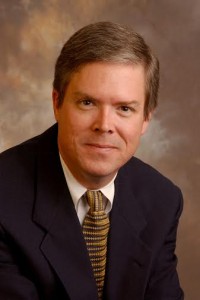 Emory University’s Director of Baptist Studies, the Reverend David Key, is proud to stand with a growing number of Georgia faith leaders to speak out against the proposed Religious Freedom Restoration Act—which if passed will allow individuals and businesses to discriminate against others under the guise of so-called “religious freedom.”
Emory University’s Director of Baptist Studies, the Reverend David Key, is proud to stand with a growing number of Georgia faith leaders to speak out against the proposed Religious Freedom Restoration Act—which if passed will allow individuals and businesses to discriminate against others under the guise of so-called “religious freedom.”
A lifelong Georgian, Key grew up in Augusta, but currently resides in Madison, Georgia with his wife Pam of 26 years, along with their two children.
Rev. Key is guided by a faith that teaches, at its core, that discrimination is wrong. That’s why one of the things that incenses Rev. Key so much about this proposed legislation is the egregious redefinition of “religious liberty,” a concept deeply rooted in the Baptist tradition.
“Religious liberty… the concept is a very strong Baptist concept, and I teach Baptist history at Emory so I’m very much involved in the religious liberty dynamics. But RFRA is trying to redefine what religious liberty truly means, because now it’s not so much about you participating in your religious practices, it’s now about… can you now discriminate against people based on religious tradition?”
Key continues, “I’m old enough to remember when Baptists were claiming religious liberty because our missionaries could not go into Spain. The Roman Catholic Church refused to let them in. Now a days when we talk about religious liberty of Christians who simply want to worship together, say in Saudi Arabia, that is an element of religious liberty. But to sit there and then say I’m going to discriminate against people based on religious liberty in some ways trivializes the experience of these other Christians, some of which had to die for just worshipping their faith.”
For Rev. Key, there’s no doubt that the so-called RFRA misappropriates religious liberty to allow for discrimination—and he calls on his fellow religious leaders across Georgia to join him in working to defeat it.
“I think it’s incumbent on those who are religious leaders to be the ones to stand up and say wait a minute, let’s not try to use this law to say that we are victims when there are a lot of ways that we have a level of privilege in society. Religious leaders have that responsibility.”
One of the more concerning aspects of this law, he argues, is that it will help those who are already in power, at the expense of those who are not.
“I think it will allow people of certain faith traditions to think they have on their side the ability to not do certain things, which they should do. If they are in public service, they should be serving the public, and if they argue their religious liberty prevents them from serving a segment of the public, they will be able to use this law to justify it.”
Furthermore, Key fears that this law would almost certainly be used to allow for discrimination against gay and transgender people in Georgia—including his older brother, who is gay
“There is a certain fear there. LGBT people don’t have the law behind them, where people can cause harm to those people, including my brother… When we bestow that they are lesser than the rest of us, it’s not only harmful to them, it’s harmful to us as well because that’s not the community we need to be building.”
But even if it weren’t for his brother Jimmy, Rev. Key argues that he would still feel that it is imperative to speak out against this law, for the simple fact that no one should be discriminated against just for being who they are.
“I think it’s the right thing to do. Standing up for the right thing to do, there’s really no personal interests other than what would be best for the state of Georgia and for my community.”
SHARE THIS STORY


 @GeorgiaUnites
@GeorgiaUnites